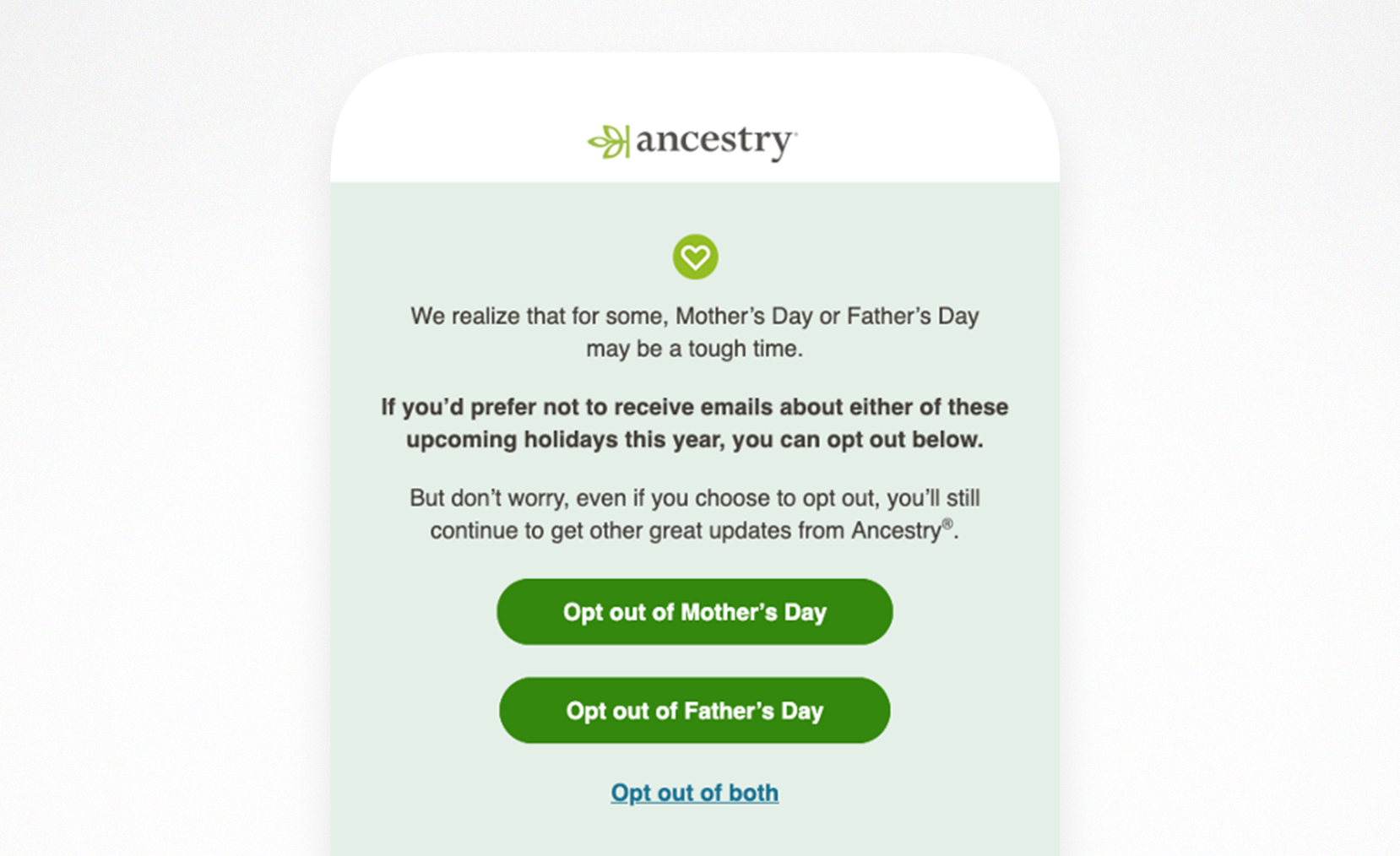This time of year, our email inboxes are jammed with promotions tied to Mother’s Day. It’s usually pretty harmless. Really, companies are just trying to fill their marketing calendars and revolving them around holidays is an easy way to do that. But one recent email stood out to us. It was from Ancestry, the online platform that does DNA testing and then helps connect you with distant relatives (if you so desire). It also offers pretty robust genealogy research tools. Anyway, here’s the subject line of their latest campaign:
Want to opt out of Mother's Day
or Father's Day emails?
So when was the last time a company brought up the idea of backing out of whatever they’re trying to promote to you? If you responded, “never” or “a very very long time ago,” you’re probably right. And you can’t blame them. They’ve worked hard to get your contact info, so they want to use it as much as they can.
Once we opened the Ancestry email, we got a better sense of what the subject line was all about. Here’s the entirety of what it said:

Then it had the opt out buttons and a notice that the preferences just applied to this year. But that was it—no touting new features, no testimonial of a happy customer, not even a reminder of who they were.
Did this mailing help them to sell any services? Absolutely not. But that wasn’t the goal. What it did was it built their brand. It demonstrated that Ancestry knows their customers, not just by their demographics, but by their feelings and motivators. What is Ancestry’s audience? Here’s our assumption:
One-Time Users:
These are people who are just excited to try out a DNA test. After sending it in and getting their results, they explore the site once or twice and that’s it.
Casual Users:
This group visits the site every now and then to see if there are any new family connections or genetic trait updates..
Serious Genealogists:
These folks are trying to map out their family trees many generations back.
People Searching for Lost Family:
The goal here is to find relatives that are missing or even unknown.
For the first three groups, getting a Mother’s or Father’s Day email probably doesn’t mean anything. But for the last group, it could be a sensitive topic. Perhaps they gave up a child for adoption or they were adopted. Maybe they lost custody or the pressures of life separated them for whatever reason. If they’ve been trying to trace their birth mother or father or their daughter or son for years to no avail, then to get a Mother’s or Father’s Day email from the service that was supposed to help them bridge that gap might feel like a slap in the face.
But by sending this opt-out notice, it showed that Ancestry understands what some of their customers are going through. They can empathize. And they don’t want to cause hurt at the expense of a marketing email. It really conveyed an emotional intelligence that a lot of companies lack, or at least put on the sidelines in support of trying to reach as many potential customers or to make as many sales as possible.
It’s true that the majority of Ancestry’s audience wouldn’t think twice about the Mother’s Day emails or even about this opt-out notice. But for those it did speak to, we’re guessing it really mattered. And in their eyes, Ancestry just gained a whole lot of brownie points.
Know your audience. And know what separates each group—not just in a bullet-point kind of way, but when it really comes down to what affects them. As much as you can, speak to them individually. That’s what makes a person feel seen, heard and special. And it could be what makes them stick by you.
Want to get a better handle on who you’re talking to? Let us guide you through a personalized customer journey so your audience can go from 2D to 3D—and you can start making more meaningful connections.
